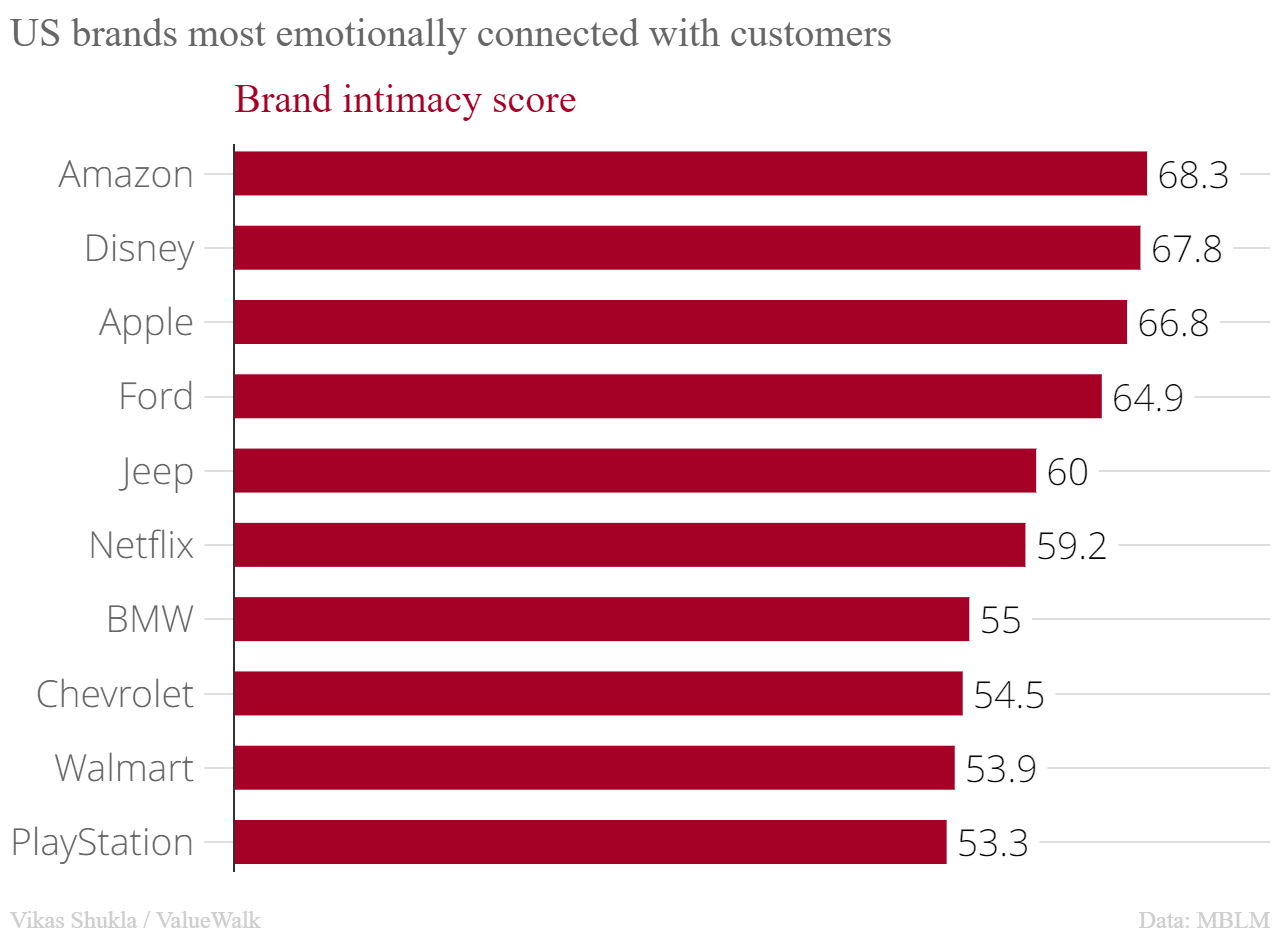It has become increasingly difficult for brands to build strong emotional connections with their customers. People are in control of how and when brands can interact with them. Brands that don’t have a real emotional connection with their customers are at a disadvantage because emotions play a critical role in purchase decisions. Here we take a look at the top 10 US brands that are most emotionally connected with their customers.
Ranked: Brands most emotionally connected with their customers
The ranking is based on brand intimacy agency MBLM’s 2020 Brand Intimacy report. MBLM and Praxis Research Partners surveyed more than 6,000 people to determine their perceived emotional bond with leading brands.
Survey participants were asked to rate their emotional connections with brands on a spectrum from fairly detached to highly intimate. MBLM also screened participants for age (18-64 years) and annual household income ($35,000 or above).
Amazon topped the list for the first time in ten years with a brand intimacy score of 68.3. Disney, which led the rankings last year, fell to the second place. Apple occupied the third spot. Notably, it was the first time since MBLM started measuring brand intimacy about a decade ago that Amazon ranked higher than Apple.
MBLM forecasted Amazon’s rise to the top several years ago. The e-commerce giant’s brand dominance coupled with its huge portfolio helped it form “intense and essential bonds” with its customers.
MBLM managing partner Mario Natarelli said most of Amazon’s customers “can’t imagine” living without it. The online retailer’s Amazon Prime subscription service bundles music streaming, video streaming, and free delivery. It also has Echo and Kindle products, Alexa AI assistant, and cloud solutions that are deeply integrated into people’s lives.
Disney’s massive library of successful content has kept it near the top of the list. Apple was the most loved US brand in 2018, but slipped to 2nd place in 2019 and 3rd place in 2020. Most brands struggle to connect with their customers in authentic and meaningful ways. MBLM’s Naratelli says brands and customers bond in the same ways people bond with one another.
People bond strongly with auto, entertainment brands
Overall, as many as four automobile brands made it to the top ten, up from three last year. Three brands belonged to the media & entertainment sector, down from four in 2019. Apple was the only technology & telecom brand on the list.
The survey found that consumers’ willingness to pay more for intimate brands rose by 13%. Also, brands that are part of the smartphone ecosystem tend to rank higher than those that are not.
MBLM added that women have a higher brand intimacy than men. Among women, the top three most intimate brands were Disney, Amazon, and Apple. It was Ford, Amazon, and Apple (in that order) for men.
However, millennials and Gen Z consumers have shown clear preference for gaming brands. According to the survey, millennials have the strongest emotional connections with Sony’s PlayStation console. Microsoft’s Xbox console is the most intimate brand for Gen Z customers. It reflects the changing consumer behavior amid growing popularity of online game streaming.
Missing from the list of top ten were footwear and fashion brands. Nike, the most popular footwear brand out there, was ranked 24th.
Impact of brand intimacy on financial performance
MBLM pointed out that brand intimacy has a huge impact on the company’s financial performance. The most intimate US brands significantly outperformed leading brands in the S&P 500 and Fortune 500 lists in terms of both revenue and profit growth.
According to MBLM, the top ten most intimate US brands registered an average revenue growth of 6.5% between 2009 and 2018. In the same period, the Fortune 500 brands grew their revenues at 5.1% and the S&P 500 companies witnessed a growth of 5.16%.
Profits of the US brands most emotionally connected with their customers grew at an average of 37.69% during the 2009-2018 period. The profit growth for Fortune 500 companies was 16.43% and was 6.99% for the S&P 500 companies. It indicates that companies with strong connections with their customers generate more profit and revenue than others.






